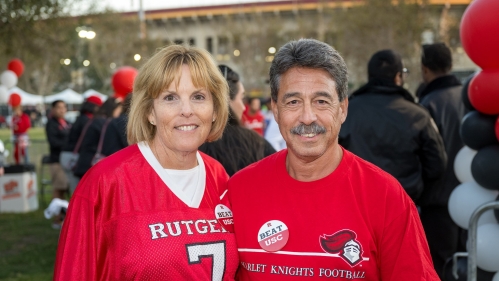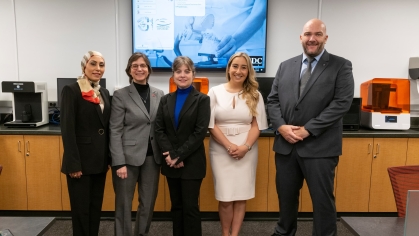Leaving a Lasting Legacy at Rutgers

Rutgers alumnus Stuart Slamowitz, a podiatric surgeon who says he “grew up” at Rutgers, is giving back to the university.
It took Rutgers alumnus Stuart Slamowitz and his wife Debbie five minutes to name the beneficiaries of their trust, finalizing their estate plans.
In deciding what they wanted their legacies to be, they sat down together and made a top ten list of causes that meant something to them—everything from polar bears to cats and dogs, to several educational institutions, including Rutgers.
“Let me tell you, it was a five-minute discussion—it was easy,” Stuart says. “We figured out ten things that were important to us, and those ten things are in our trust for legacy gifts. There are gifts to our local humane society, gifts to Polar Bears International. And then gifts to our alma maters. That's how we did it.”
The couple have provided for two endowed Rutgers scholarships in their names—one for football and one for biological sciences in the Rutgers–New Brunswick School of Arts and Sciences. Slamowitz, a podiatric foot and ankle surgeon, and Debbie, a pharmaceutical clinical program manager focusing on virology, live in Saratoga, California, in Silicon Valley, a place where entrepreneurship and innovation have created a culture of philanthropy. He says they are lucky to be able to provide resources through their trust.
“This kind of culture honors each of us, our families, our parents, and the beneficiaries,” he says. “People need to find what they're passionate about, dig deep into their souls, and think about what they want to do. It's not just for them, it's for entities that are much bigger than them as an individual.”
Slamowitz says the timing was right for Debbie, who is almost 60, and for him, almost 65, to decide how they want to contribute to organizations and causes that have enriched their lives.
“The impact each and every one of us can provide is tremendous,” he says. “I say, find passions that have enriched your lives and provide support as much as possible. You never know when your last day is.”
Growing Up at Rutgers
Attending Randolph High School in Randolph, New Jersey, was easy for Slamowitz, even with its rigorous academic program. He headed to Rutgers as a first-generation college student. Only problem was, he wasn’t all that serious about academics.

“Some kids at 18 have life perspective, most don't—I was one of those ‘most’ who don't, and I really didn't do well my first two years at Rutgers,” he says. “I was an engineering major, then I switched to a whole bunch of different things, bounced around, and then graduated with a degree in biological sciences.”
Landing on a final major is when he started applying himself academically, thanks to some good friends and support from his parents and brother. In the classroom, his anatomy, kinesiology, and embryology professors inspired him and encouraged him to pursue a career in medicine.
“I applied myself differently, I grew up,” he says. “Those relationships were important because they motivate you. I was planning on going into medicine at some point, and that's eventually what I did. My medical training was a lot easier than college because I already had grown up and I figured it out. People in medicine are pretty smart. You gotta to keep up with them.”
He went on from Rutgers to graduate from the Kent State University College of Podiatric Medicine in 1989, which launched his career in medicine. Slamowitz says he hopes the Rutgers students who receive the scholarships he and wife have endowed will grow as he did.
“I hope they figure out how to fit into the social envelope of society as well,” he says. “College is just not academics. It's growing up. It's being with other people, understanding other people and getting along with other people and having a little fun along the way.”
The Important Things in Life
At a recent medical conference, Slamowitz was struck by the words of an esteemed, world-renowned surgeon colleague who organizes this meeting each year. After 45 years of practice, he gave a final rendition of the important things of life in life: own a pet, travel and see the world, have fun, spend time with your family, choose a good life partner, and work as long as you love what you’re doing—or retire early.
“Notice, he didn't say anything about anything medical school, breaking your neck, anything about investing wisely,” he says. “He just said out of all he's done in 45 years, these are the important seven things that he's figured out. I found that amazing.”
As a former high school drum major and president of a volunteer EMS organization at Rutgers his senior year, Slamowitz has gained a few life perspectives himself. While he was not a great musician, he says, “there's a lot to be said about people who are not necessarily great musicians, but can be great leaders and conductors. That was me.”
His list of important life lessons is different from his colleague’s, but just as insightful. Slamowitz says, “Always be grounded. Be proud of your accomplishments—they've taken years and decades to fulfill. For students, explore as much as you can. You will be doing this throughout your life. Do not for a moment miss any opportunities to enhance and advance your career paths. All the opportunities are a major investment in your future and in your family's future. Each experience is worthy.”

WE ARE YOU is an ongoing series of stories about the people who embody Rutgers University’s unwavering commitment to academic excellence, building community, and the common good.
Be Part of the Rutgers Story
Discover giving opportunities that support core Rutgers values.
Learn More

